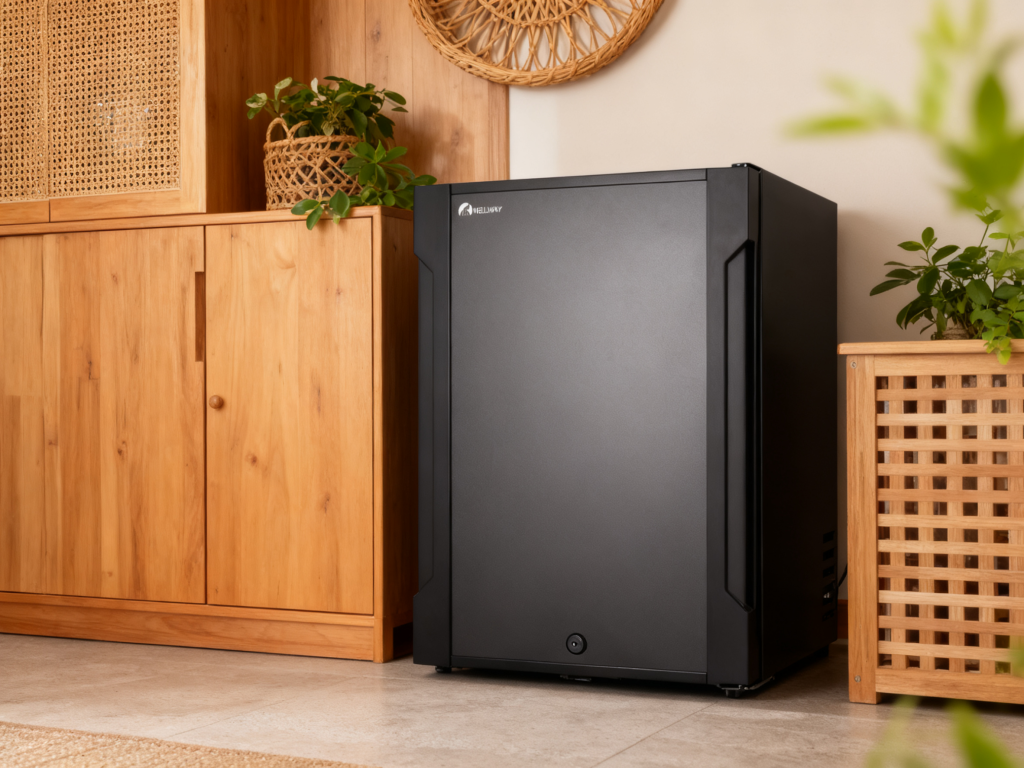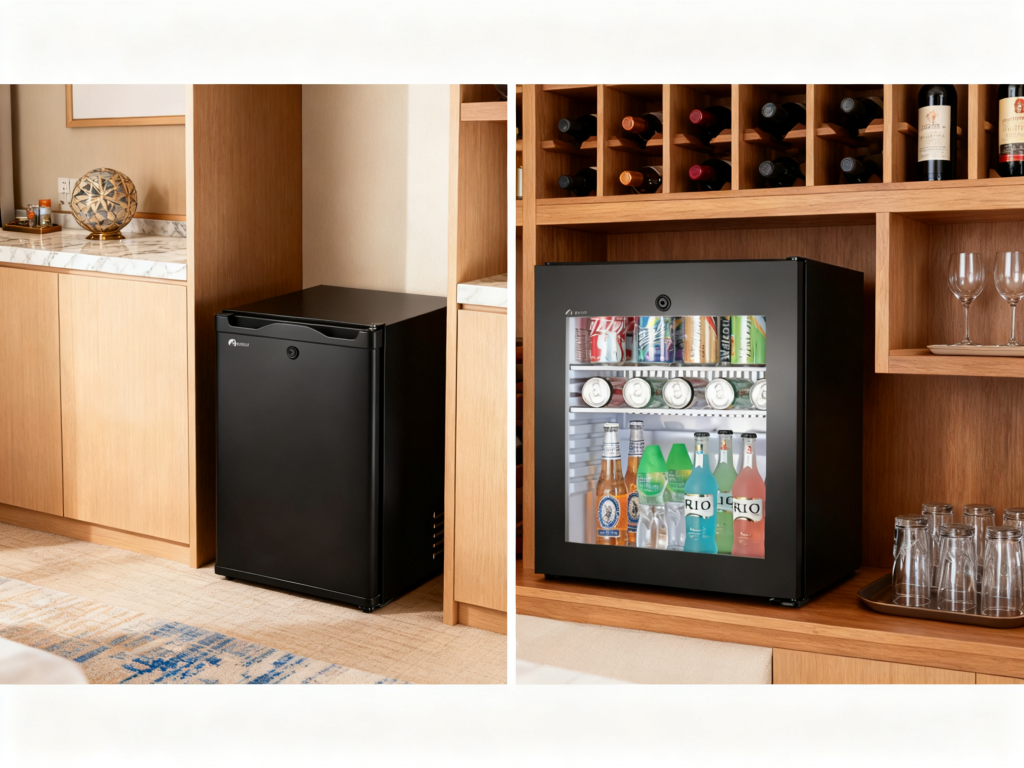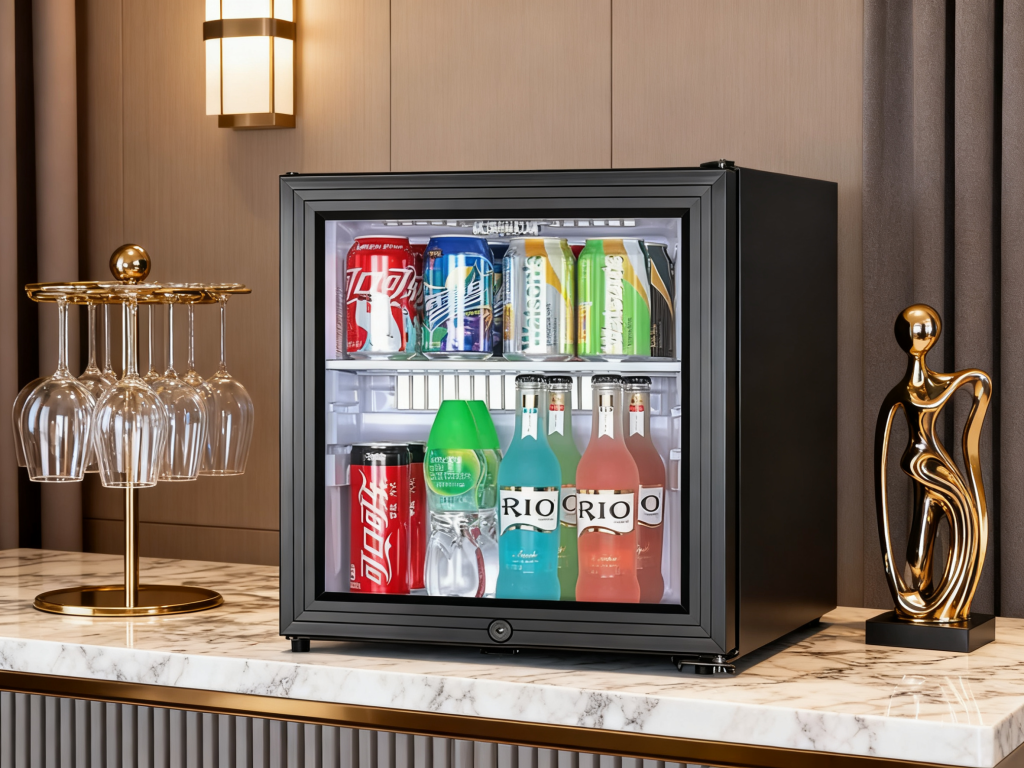In modern hospitality, every detail matters — from the lighting in the lobby to the temperature of a guest’s favorite drink. The in-room hotel mini bar refrigerator is a small but powerful symbol of comfort and quality service. For hotel operators, maintaining these refrigerators efficiently means not only keeping beverages perfectly chilled but also reducing operational costs and energy consumption.
As a professional manufacturer specializing in hotel appliances, Wellway provides advanced mini bar refrigerators designed to combine performance, silence, and energy savings. Understanding how to maintain and operate them efficiently ensures that hotels can deliver a smooth guest experience while achieving long-term sustainability.

Hotel minibar refrigerators differ greatly from standard home fridges. They are designed to operate quietly, maintain stable cooling in confined spaces, and consume minimal energy. Models from Wellway feature advanced compressor, absorption, or thermoelectric cooling systems, each optimized for different hotel environments.
Compressor systems offer powerful, fast cooling, ideal for areas with frequent restocking. Absorption minibars, on the other hand, operate silently without moving parts—perfect for luxury suites where noise reduction is essential. With eco-friendly refrigerants, efficient insulation materials, and elegant designs, these refrigerators combine functionality with aesthetics.
Correct installation is critical for long-term efficiency. Always leave enough space around the minibar for airflow. If built into furniture, ensure proper ventilation openings behind or below the unit to release heat. Poor ventilation forces the cooling system to overwork, leading to higher power usage and a shorter lifespan.
Never place the minibar near heaters, windows, or air-conditioning vents. Exposure to heat or sunlight can reduce cooling performance and increase energy demand. The unit should remain in a shaded, temperature-controlled area for optimal operation.
Selecting the right minibar model is equally important. Glass-door units help guests see contents without opening the door—reducing temperature fluctuations and saving energy. Solid-door designs are preferred for their minimalist appearance and better insulation in standard rooms.

Check the temperature settings regularly. A consistent internal temperature keeps beverages fresh and avoids unnecessary energy use. Avoid setting the temperature too low—slight adjustments can make a big difference in long-term efficiency.
Every door opening releases cold air, forcing the unit to work harder to restore temperature. Encourage staff to minimize restocking times and keep doors closed when not in use. Fewer door openings lead directly to lower energy consumption.
Do not overfill the minibar. Overcrowding blocks airflow, reduces cooling efficiency, and may cause uneven temperature distribution. Leave adequate space between items to allow air to circulate freely.
Regular cleaning is one of the simplest ways to maintain performance. Wipe down the interior with mild detergent and check door seals for dirt or damage. A clean, well-sealed door ensures that cool air stays inside and warm air stays out.
Clean condenser coils and ventilation grilles monthly to remove dust and dirt buildup. Blocked coils make it harder for the unit to release heat, increasing both energy use and compressor wear.
Inspect door gaskets, hinges, and interior components every three months. Make sure the door closes properly, the shelves are stable, and the light functions correctly without generating excess heat.
If the minibar model is not frost-free, defrost once or twice a year. Ice buildup reduces cooling performance and increases energy consumption. Allow the unit to thaw completely before restarting it.
Schedule professional servicing at least once a year. A technician can test the compressor, check refrigerant levels, inspect electrical components, and ensure the system operates safely and efficiently. Preventive maintenance helps extend the unit’s lifespan and prevents unexpected breakdowns.
Modern Wellway hotel mini bar refrigerators are engineered with high efficiency and sustainability in mind. Using low-energy compressors and environmentally friendly refrigerants, these models help hotels reduce electricity costs and their carbon footprint.
Each hotel space has unique requirements. Absorption-type minibars are silent and ideal for guest rooms, while compressor types deliver fast cooling for high-turnover environments. Choosing the right technology ensures balanced performance and energy optimization.
Smart hotel systems can monitor minibar temperatures and power consumption remotely. Automated standby functions or occupancy-based control can reduce energy waste in unoccupied rooms.
Even the most reliable minibar refrigerator may occasionally show signs of wear. Here are some quick checks:
Regular attention to these areas keeps your minibar fleet performing consistently and efficiently.
With years of experience in designing and manufacturing hotel minibar refrigerators, Wellway understands the balance between style, silence, and sustainability. Each product is crafted to meet global hospitality standards, offering reliable cooling, elegant aesthetics, and energy-efficient technology.
Wellway’s range of hotel refrigerators includes models suitable for luxury resorts, boutique hotels, and business accommodations—available in various capacities, finishes, and cooling technologies. Partnering with Wellway means investing in equipment built for durability, performance, and guest satisfaction.

Keeping hotel mini bar refrigerators running efficiently is a key part of modern hotel management. From correct installation and daily care to regular maintenance and professional servicing, small steps can lead to major savings in energy and repair costs.
By choosing quality minibar refrigerators—like those designed by Wellway—and maintaining them with care, hotels can ensure quiet operation, reliable performance, and an enhanced guest experience. Efficient minibars are not only an amenity; they’re a mark of professionalism, sustainability, and thoughtful hospitality.
Recent postsLearn More